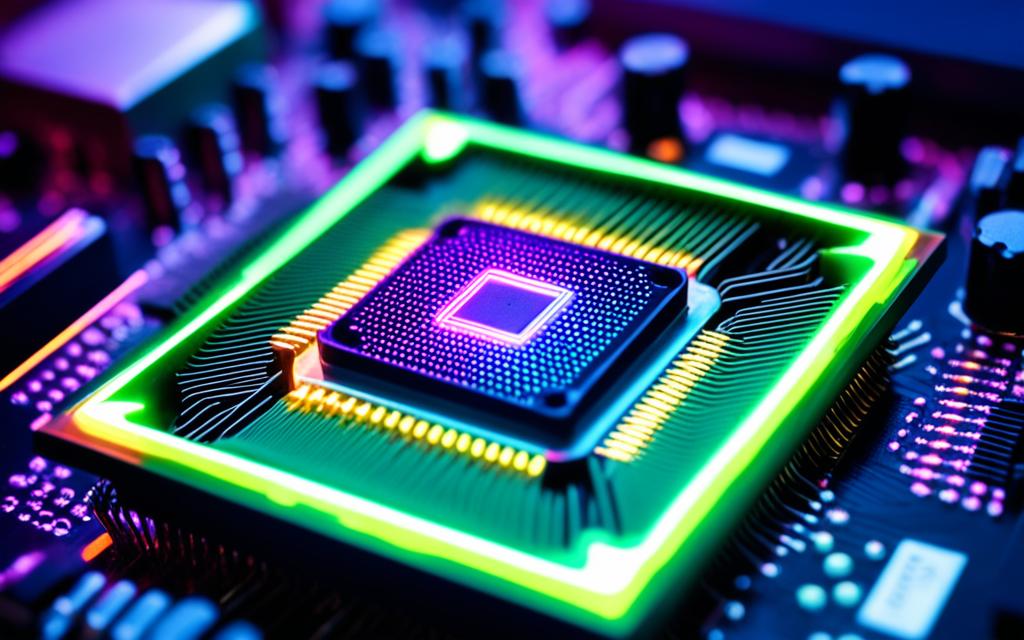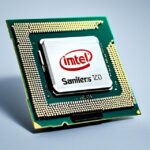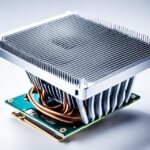Table of Contents
In the world of computing, CPU overclocking stands out for those wanting better performance. It promises enhanced gaming performance and system efficiency. But, is overclocking really worth the risks and effort? This article tackles the many aspects of CPU overclocking. We’ll look at its benefits, dangers, and what you need to know to keep your system stable and your hardware lasting longer. With the right knowledge, you can decide if overclocking fits your needs and goals. For a deeper look, see this thorough analysis1.
Key Takeaways
- Overclocking can boost performance greatly with proper cooling.
- Many modern CPUs have safety features, but manual overclocking is still an option for several.
- It’s important to evaluate your motherboard and cooling system first.
- Though overclocking has advantages, it can also bring risks like less stability and shorter hardware life.
- Some Intel and AMD processors are made for overclocking, making them great for this tweak.
Understanding CPU Overclocking
Overclocking is a fascinating activity where enthusiasts boost their CPUs past expected limits. To define overclocking, it’s about making the CPU’s clock speed faster. This boost is crucial for high-demand tasks like gaming or video editing.
What is Overclocking?
Overclocking means changing BIOS settings to get higher clock speeds. You adjust the core multiplier and voltage. For instance, changing a multiplier of 36 could raise a base speed to 3.6 GHz. This helps with more operations per second, enhancing tasks such as 3D rendering and top-tier gaming.2
How Overclocking Works
The process involves raising the CPU clock speed step by step. Start with stress tests like Prime95 to check stability. Use benchmarking tools like Cinebench and AIDA64 to measure CPU performance improvements3.
Potential Benefits for Performance
Overclocking can lead to major performance boosts. You might see speeds grow from 5% to 300Hz, notably improving CPU-heavy tasks. Tuning carefully, gains could be 20-40%, making overclocking valuable for gamers and pros alike.
Factors to Consider Before Overclocking
Thinking about overclocking your CPU? It promises better performance and gaming. But, you must consider the costs, hardware, and heat first. It’s key for anyone eager to try.
Cost Implications
Overclocking isn’t cheap. High-end CPUs, like Intel’s K series, often cost more than £200. You also need the right cooling and motherboard. Think about these costs versus the performance boost you might get.
Hardware Requirements
Your CPU and motherboard must support overclocking. Look for a CPU with a K or X and a Z or X series motherboard. Don’t forget about extra cooling to handle the heat from faster speeds and voltages.
Power Consumption and Heat Generation
Overclocking means your computer uses more power and gets hotter. This can cost you more in energy bills. A good cooling system keeps overheating at bay, protecting your components. Without it, your CPU’s life could shorten, and you might need early upgrades.
| Factor | Details |
|---|---|
| Cost Implications | Higher initial investment needed for compatible CPUs and motherboards, along with cooling solutions. |
| Hardware Requirements | Ensure CPU and motherboard support overclocking; look for K or X marked processors. |
| Power Consumption | Higher energy usage expected due to increased clock speeds, affecting overall electricity bills. |
| Heat Generation | Requires effective cooling solutions to manage increased thermal output from overclocked components. |
Taking these factors into account makes overclocking smoother. You enhance both performance and stability. This journey can be hugely satisfying456.
Should I Overclock My CPU?
Deciding to overclock your CPU needs you to think about your setup and its pros and cons. Many seek better gaming performance or to boost demanding apps. It’s key to check your system first before overclocking.
Assessing Your Current Setup
Start by checking your system’s specs, especially your cooling solutions and CPU’s performance. It’s vital to know if your hardware can cope with overclocking’s extra heat. Often, you might need a bigger CPU cooler, maybe twice as large, to keep things cool7.
Performance Gains vs. Risks
The chance of boosting performance by overclocking is tempting, but be aware of the risks. You might boost CPU performance by over 40% in perfect conditions. Yet, overclocking can void warranties and cause stability issues8. These problems could offset the performance benefits9.
Impact on Gaming and Resource-Intensive Tasks
For gaming and demanding tasks, overclocking can be a game-changer. It often improves frame rates and makes gameplay smoother. In the right conditions, overclocked systems can push frame rates from 90 to 140 FPS or more. This boosts your gaming experience significantly8. Many gamers believe that proper overclocking is key to maximising efficiency in their favourite games9.
Successful overclocking needs careful planning, constant monitoring, and open-mindedness towards tech.
In short, choosing to overclock means evaluating your current setup, considering the potential benefits and risks, and understanding its effect on gaming and demanding apps. With careful consideration, you can master overclocking and enjoy its advantages.
When thinking about overclocking, keep your gaming needs and system’s limits in mind. A thoughtful approach ensures a better experience and protects your hardware.
Risks and Challenges Associated with Overclocking
Overclocking CPUs can boost performance but comes with big risks. It’s key for those interested to understand these issues.
Voided Warranty and Stability Issues
Overclocking may void your warranty. Manufacturers often see it as breaking the terms, leaving you to cover any repairs10. Also, it can make your CPU unstable, leading to crashes, freezes, or data corruption11.
Overheating Concerns
Higher clock speeds mean more heat. Without good thermal management, this can seriously overheat and harm your CPU12. Good cooling systems and regular temperature checks are crucial to avoid damage11.
Long-term Effects on CPU Lifespan
Overclocking boosts speed but may shorten your hardware’s life. Constant high-speed operation increases wear and tear, cutting expected lifespan to 10 to 15 years12. Even modern CPUs with safety features might not last as long10.
Conclusion
Overclocking lets you boost your CPU’s speed, ideal for gaming and heavy apps. But, it’s important to think before you act because of the risks. These include more heat and possible shorter life for your parts. Overclocking can raise performance by over 250%13, yet you must be cautious.
With the right cooling and voltage control, you can improve your system safely14. Learning about CPU performance is key to deciding if overclocking is for you. It ensures you boost your hardware without harming its durability.
Choosing to overclock needs careful thought and attention. It’s a balance between getting more power and avoiding risks. If done smartly, overclocking boosts speed and breathes new life into old systems. For more details on safe overclocking, check out this guide.
FAQ
What exactly is overclocking?
Overclocking boosts a CPU’s speed beyond its intended peak. It makes computers run faster for gaming and video editing.
How does the overclocking process work?
Adjusting settings in the BIOS is essential for overclocking. This includes the CPU multiplier and voltage. It’s crucial to keep the system stable and cool, as overheating can happen.
What potential benefits can I expect from overclocking?
Overclocking can enhance performance, especially for demanding tasks. You might see gains of 20-40% with good tuning. This is great for gamers and professionals.
Are there significant costs associated with overclocking?
Overclockable CPUs like Intel’s ‘K’ series can push costs up. Expect to spend over £200 on a cooler and motherboard that fit. You must weigh this against the potential performance boost.
What are the hardware requirements for successful overclocking?
Not every CPU and motherboard allows for overclocking. You need compatible hardware and might need better cooling to manage the extra heat.
Will overclocking affect my power consumption and heat generation?
Overclocking means more power use and more heat. Good cooling systems are key to avoid overheating and damage to your components.
How do I assess my current setup for overclocking?
Check if your cooling is up to the task and if your CPU is not already maxed out. This helps decide if overclocking is possible.
What are the risks of overclocking compared to potential performance gains?
Overclocking brings higher performance but also risks like instability and overheating. Think about these before deciding to overclock.
How does overclocking impact gaming and other resource-intensive tasks?
Overclocking can make games and demanding apps run better. It increases frame rates for smoother gameplay. Overclocked systems often outperform in heavy tasks.
Does overclocking void my warranty?
Overclocking can void warranties for your CPU and motherboard. If something goes wrong, you might have to cover repair costs. It can also cause crashes or data loss.
What overheating concerns should I be aware of?
Overclocking increases heat, which can harm hardware if it’s not controlled. Use good cooling and monitor temperatures to lower risks.
What are the long-term effects of overclocking on CPU lifespan?
Overclocking might reduce a CPU’s life due to increased stress. Even with safety features, expect a shorter lifespan of 12-15 years instead of 20.
Source Links
- https://www.tomshardware.com/how-to/how-to-overclock-a-cpu – How to Overclock Your CPU: Get the Most GHz from Your Processor
- https://www.avast.com/c-how-to-overclock-cpu – How to Safely Overclock Your CPU for PCs & Laptops
- https://www.digitaltrends.com/computing/should-you-overclock-your-pcs-processor/ – What is Overclocking and Should You Overclock Your CPU? | Digital Trends
- https://www.intel.com/content/www/us/en/gaming/resources/how-to-overclock.html – How to Overclock Your Unlocked Intel® Core™ Processor
- https://www.crucial.com/articles/about-memory/what-is-overclocking – What is Overclocking? Examining Pros and Cons
- https://www.hp.com/us-en/shop/tech-takes/how-to-overclock-pc-cpu – How to Overclock Your PC’s CPU | HP® Tech Takes
- https://www.linkedin.com/advice/1/what-pros-cons-overclocking-your-cpu-gpu-gaming – What are the pros and cons of overclocking your CPU and GPU for gaming?
- https://www.overclock.net/threads/is-overclocking-pointless-is-high-end-setups.1807359/ – Is overclocking pointless is high-end setups??
- https://www.pgmusic.com/forums/ubbthreads.php?ubb=showflat&Number=539588 – Should I be overclocking my CPU?
- https://www.auslogics.com/en/articles/how-to-overclock-the-cpu-to-make-a-pc-faster/ – How to Overclock the CPU on a PC and Laptop
- https://scot-comp.co.uk/overclocking-balancing-performance-gains-with-potential-risks/ – Overclocking: Balancing performance gains with potential risks.
- https://www.codecademy.com/resources/blog/how-to-overclock-cpu/ – How to (Safely) Overclock a CPU
- https://www.tomshardware.com/reviews/cpu-overclocking-guide,4593.html – CPU Overclocking Guide: How (and Why) to Tweak Your Processor
- https://scotcomp.medium.com/overclocking-balancing-performance-gains-with-potential-risks-fab7f31385ab – Overclocking: Balancing performance gains with potential risks








